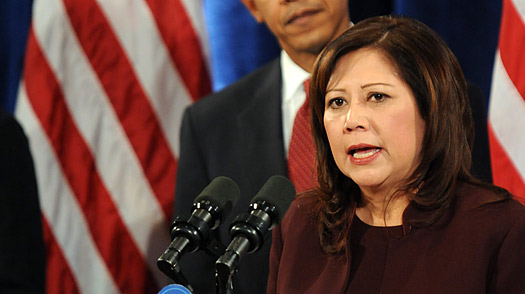
When President-elect Barack Obama tapped California Democrat Hilda Solis to be his administration's Labor Secretary, union leaders across the country rejoiced. The four-term Congresswoman has spent the better part of two decades championing workers' rights, including the Employee Free Choice Act, a new bill that would make it easier for workers to organize. But some Republicans have taken issue with her legislative approach, deriding her as an unyielding advocate of environmentalists and labor groups. Solis might very well agree with the "unyielding" part: she told the Los Angeles Times in 2000 that compromising "just to keep things moving along" is her least favorite part of the job.
• Born in 1957 to Juana and Raul Solis, who met in citizenship classes in California. Solis' mother, a native of Nicaragua, worked on an assembly line while her father, a Mexican immigrant, worked as a steward for the Teamsters union.
• As the third of seven children, Solis served as a role model for her younger siblings by becoming the first person in her family to attend college, at California State Polytechnic University, Pomona.
• Served in the Office of Hispanic Affairs under the Carter Administration and later in the Office of Management and Budget while earning a master's degree at USC in 1981.
• Reportedly lost 20 pounds while canvassing for her first seat in public office during her 1985 campaign — to join the Rio Hondo Community College Board of Trustees.
• In 1994, became the first Latina elected to the California state senate, where she successfully pushed through legislation to increase the minimum wage from $4.25 to $5.75 an hour.
• First elected to Congress in 2000 after defeating incumbent Matthew Martinez during a bitterly fought primary campaign. On election night, Martinez blasted his rival as "obnoxious" and soon afterward switched to the Republican party.
• Became the first woman to win the Profiles in Courage Award from the John F. Kennedy Library Foundation. Solis donated the $25,000 award to local environmental groups and, after some debate, decided to keep the second part of the prize, a silver lantern worth $10,000, as the California Fair Political Practices Commission ruled that accepting it would not violate the state's conflict-of-interest laws.
Quotes By:
"When union people get paid good wages, that money stays in the community, it helps to provide a vibrant economy, it helps to also even send their children like me...to college and to eventually even run for office."
— On the Employee Free Choice Act, which would make it easier for employees to form unions and to bargain with employers (Washington Post, Dec. 18, 2008)
"I had butterflies. I'm a very cautious person."
— On her decision to challenge Martinez for his House seat ( L.A. Times, December 28, 2000)
"He always reminded us that it was important to stand up for your rights, and regardless of who you are and where you come from, to hold your head up high with dignity and respect."
— On what she learned from her father (California Journal, 2001)
Quotes About:
"She will carry their water, no matter what."
— Sen. Ray Haynes (R-Riverside), accusing Solis of being beholden to the labor and environmental lobbies (L.A. Times, Dec. 28, 2000)
"She's going to be a national star."
— Art Torres, head of the California Democratic Party, calling Solis "one of the most grounded people I know." (L.A. Times, Dec. 28. 2000)
"She's been as strong a voice for justice for SEIU workers like our janitors and homecare workers as we've ever had."
— Andy Stern, president of the Service Employees International Union, reacting to Solis' nomination as Labor Secretary (Bloomberg, Dec. 18, 2008)
"Business groups will need to be very, very well prepared when they go and see her. Because in moving forward the Obama agenda she won't be taking any prisoners."
— Jim Brulte, former Republican leader in the California Senate, on her reputation as a tenacious fighter for unions (AP, Dec. 18, 2008)